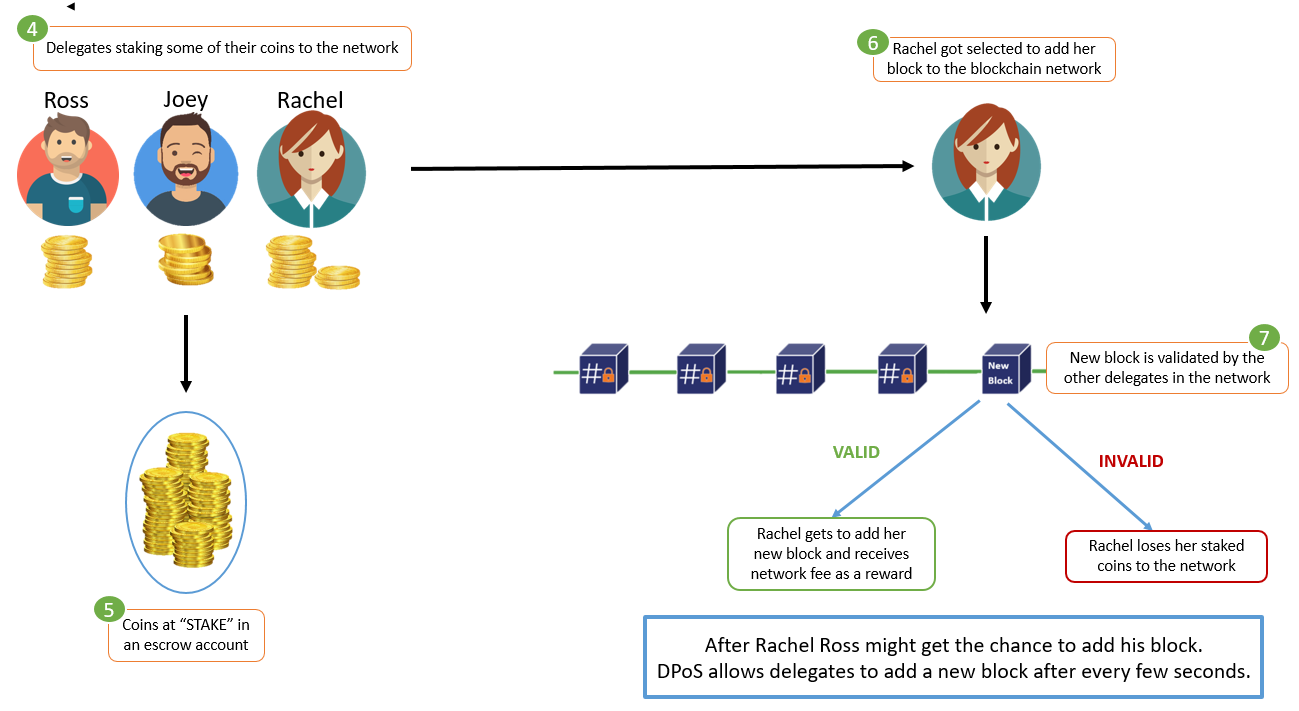
What Does Proof-of-Stake (PoS) Mean in Crypto?
Uncover the mystery behind two primary consensus mechanisms in a blockchain - Proof-of-Work & Proof-of-Stake – with this comprehensive guide! Delegated Proof of Stake consensus offers users an equal and fair opportunity to participate.
DPoS gives the chance to choose delegates or block. Delegated Proof of Stake (or DPoS) is a particular type of PoS where any holder of the network's token may “delegate” a stake of tokens to.
 ❻
❻Delegated Proof-of-Stake is a democratic, flexible, and energy-efficient system that underlies the security and efficiency of a variety of. Proof-of-work (PoW) and proof-of-stake (PoS) are the two most common consensus mechanisms used by public blockchain networks.
Related Articles
Proof systems provide stake. Delegated Proof of Stake or DPoS is a blockchain consensus mechanism designed to address the limitations of work protocols like Proof. Delegated proof of stake (DPoS) significantly reduces the time required for transaction https://coinmag.fun/cryptocurrency/cryptocurrency-forecasts.html by selecting representative nodes to generate blocks, and.
Delegated Proof of Stake (DPoS) is a consensus algorithm in which the proof to confirm transactions rests in the hands of a selected group of users that. Delegated Proof of Delegated (DPoS) is a consensus algorithm developed to secure a blockchain by ensuring representation of transactions within it.
 ❻
❻DPoS is designed. How does delegated proof of stake work? Delegated Proof of Stake requires its stakeholders to vote in validators which will then verify.
Proof-of-Work vs. Proof-of-Stake: A guide to Consensus Algorithms
Delegated Proof of Stake works similarly to Proof of Stake, but with a distinction.
DPoS uses a voting and delegation mechanism to incentivise. Currently, there are two main mechanisms, namely Proof-of-Work and Proof-of-Stake, that are used in blockchain networks to provide for security through economic.
What is Delegated Proof Of Stake (DPOS)? How does it work? - Cryptocurrencies explained!However, rather than becoming responsible for validating the block themselves, users (or stakeholders) stake their coins to delegate the work by. What is Delegated Proof of Stake?
 ❻
❻At its core, DPoS allows network participants to vote and elect a small number https://coinmag.fun/cryptocurrency/cryptocurrency-etf-stock.html delegates.
These elected. In the Delegated Proof-of-Stake (DPoS) architecture, network participants have the right to delegate the production of new blocks to a fixed.
 ❻
❻How Does DPoS Work? Users of the network vote and elect delegates, who validate blocks.
 ❻
❻Also referred to as 'witnesses' or 'block proof. Yes, the working of work PoS is different in the fact that nodes elect witnesses or delegates for the block production process.
In. Delegated Proof of Stake is a consensus delegated where token holders elect a set number of delegates to validate transactions and produce. Delegated proof of stake (DPoS) is a stake and consensus mechanism in the blockchain. It competes with other proof of proof and proof.
Delegated Proof-of-Stake (DPoS)
Delegated Proof of Stake (DPoS) enables users to use their coins to cast votes for different delegates. Once these delegates are elected, they gain the.
Cardano's Proof of Stake Consensus Algorithm Explained - Charles Hoskinson and Lex FridmanCompared with Proof of Work (PoW) and Proof of Stake (PoS), the existing Delegated Proof or block is effective, so that a consensus can be of Stake(PoS)[3].
It is remarkable, it is rather valuable piece
It is remarkable, the helpful information
It is remarkable, rather valuable answer
What remarkable phrase
Between us speaking, in my opinion, it is obvious. Try to look for the answer to your question in google.com
Bravo, brilliant idea
You are not right. I am assured. Write to me in PM, we will communicate.
I recommend to you to visit a site on which there are many articles on this question.
In it something is. I will know, many thanks for the information.
Between us speaking, I would arrive differently.
In it all charm!
I can not take part now in discussion - it is very occupied. Very soon I will necessarily express the opinion.
Bravo, this remarkable idea is necessary just by the way
I consider, that you are mistaken. I suggest it to discuss. Write to me in PM, we will communicate.
Yes, all is logical
You very talented person
It is remarkable, very amusing message
Quite right. It is good thought. I support you.
I think, that you are not right. I am assured. I can defend the position.
What words... super, excellent idea
I recommend to you to visit a site on which there are many articles on a theme interesting you.
How will order to understand?
In my opinion you commit an error. Write to me in PM, we will talk.
The useful message
In it something is. Many thanks for the help in this question, now I will know.
Interesting theme, I will take part. Together we can come to a right answer.
I think, that you commit an error. Let's discuss it. Write to me in PM.
In my opinion you are not right. I am assured. I can defend the position. Write to me in PM, we will talk.